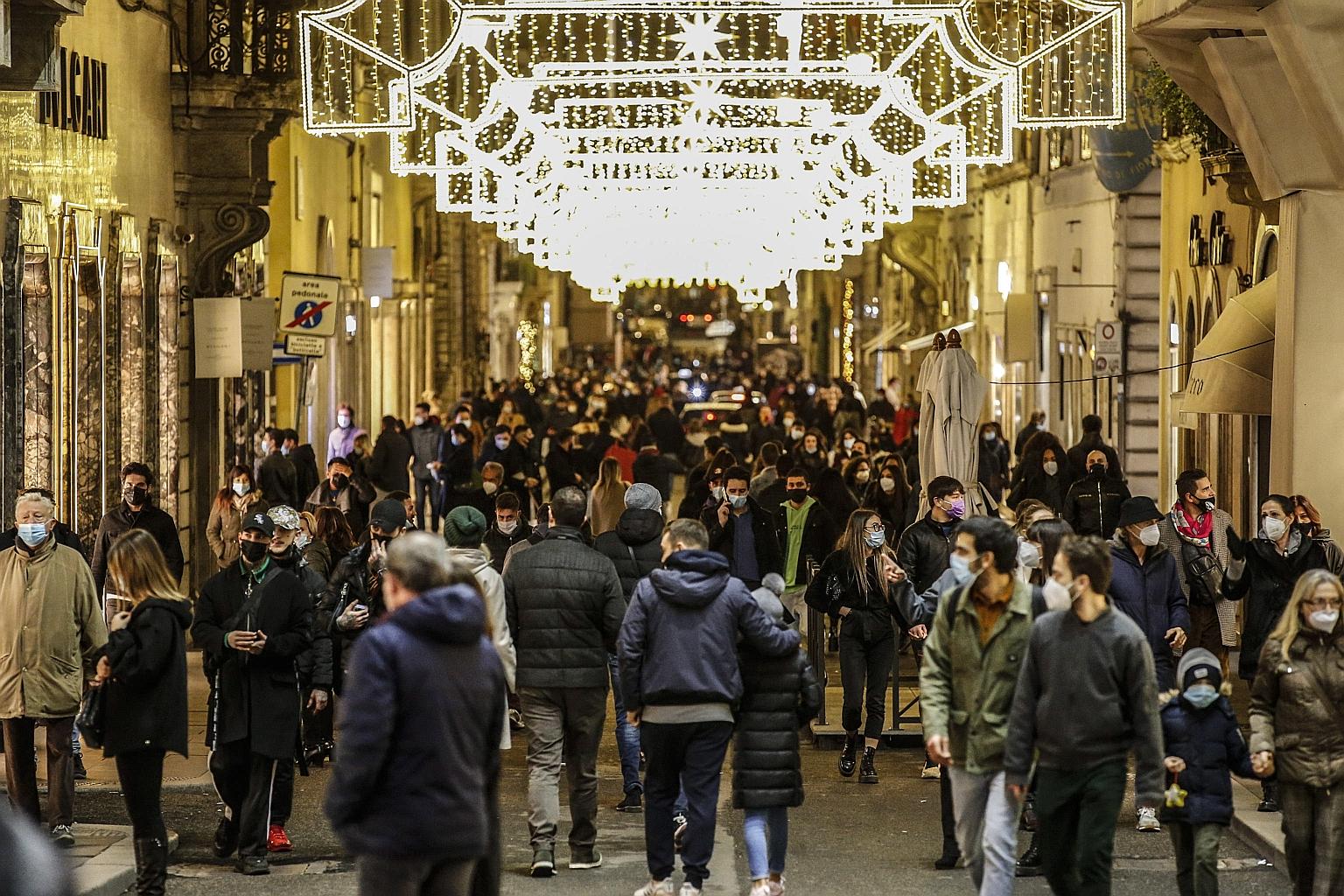Coronavirus
A not-so-merry Christmas in Europe with tighter curbs
No midnight mass in Italy, while restaurants in Germany will remain closed till January
Sign up now: Get ST's newsletters delivered to your inbox

Rome's famous Via Condotti shopping street on Sunday. Italy, the first European country hit by Covid-19, yesterday announced national travel restrictions for the Christmas holidays. The new rules, together with an existing curfew and other regulations already in place, seek to curb circulation throughout the country during the festive period by limiting the number of gatherings. PHOTO: EPA-EFE
ROME/BERLIN • Several European countries have tightened the movement of people to curb a resurgence of Covid-19 ahead of Christmas and New Year.
Italy, the European country first hit by the pandemic, yesterday announced national travel restrictions for the Christmas holidays.
The new rules, together with an existing curfew and other regulations already in place, seek to curb circulation throughout the country during the festive period by limiting the number of gatherings.
Italians will not be able to attend midnight mass on Christmas Eve and will be only allowed to move between regions in emergencies over the holiday period starting from Dec 20.
The government decree also includes the "strong recommendation" to avoid hosting those who do not live together.
Other rules include a 10-day quarantine for those arriving in Italy from foreign countries, beginning on Dec 20.
On Wednesday, Health Minister Roberto Speranza told Parliament: "If we let down our guard now, the third wave is just around the corner."
In Germany, Chancellor Angela Merkel said the country will extend its partial lockdown by three more weeks into next year as officials struggle to regain control of the coronavirus spread.
Restaurants and bars, along with cultural and sporting facilities, will remain closed until Jan 10 and the government will reconvene with regional leaders on Jan 4 to reassess the restrictions, Dr Merkel said late on Wednesday, after talks with the premiers of the country's 16 states.
Christmas markets, a cherished tradition, have been cancelled in many places in Germany. Dresden's sprawling Christkindlesmarkt, one of Germany's best-known holiday markets, was one of those which had been called off.
Germany's infection rates are still far too high and need to come down faster, she said in Berlin.
"We have to bemoan a very high number of deaths every day, which shows the amount of responsibility that we have."
Dr Merkel's administration last week extended the partial shutdown until Dec 20 while keeping schools and much of the economy open. The so-called "lockdown light" has yielded little progress in slowing the spread of Covid-19 to levels the government has determined as manageable.
Chancellor Merkel on Wednesday reiterated that the seven-day incidence per 100,000 citizens needs to come down to around 50 - and stay there - before restrictions can be loosened. It was unchanged at 134 yesterday, according to the latest data from Germany's Robert Koch Institute for infectious diseases.
France, which imposed tougher restrictions, is now cautiously moving to loosen curbs ahead of the Christmas holidays. But Strasbourg's popular Christmas market will no t go up this year.
Meanwhile, the four nations of the United Kingdom - England, Scotland, Wales and Northern Ireland - have agreed to relax Covid-19 curbs for Christmas to allow up to three households to meet at home from Dec 23 to 27, also letting them meet in places of worship and in outdoor public places but not at indoor hospitality or entertainment venues.
Britain on Wednesday became the first country to approve the vaccine candidate developed by Germany's BioNTech and Pfizer, jumping ahead of the rest of the world in the race to begin a crucial mass inoculation programme.
In Spain, the government agreed with the regional authorities that a maximum of 10 people per household will be allowed to gather for the Christmas and New Year holidays to avoid spreading the coronavirus, Health Minister Salvador Illa said on Wednesday.
The agreement, which applies to celebrations on Christmas Eve, Christmas, New Year's Eve and on New Year's Day, means a slight relaxation of the current general rule that allows gatherings of up to six people, except in some regions that have defined their own limits.
Movement of people between regions will be banned between Dec 23 and Jan 6, except for visits to family.
Mr Illa did not explain how this would work out or be monitored - possibly a tough task considering how many people travel at Christmas precisely to be with family.
"It is desirable that people restrict their mobility and social contacts as much as possible," Mr Illa said, encouraging people not to move despite the loopholes.
"To sum it up, this Christmas we stay at home."
AGENCE FRANCE-PRESSE, BLOOMBERG, REUTERS


